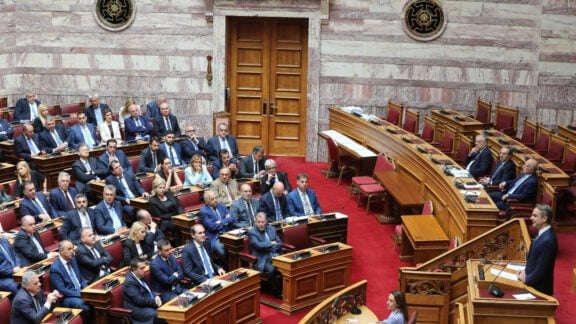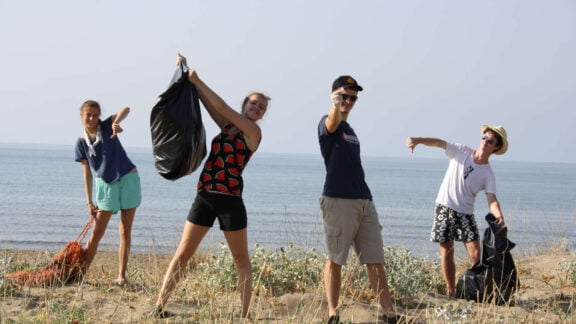Greece has announced a controversial new policy suspending asylum applications for individuals arriving illegally by sea from North Africa, with top government officials describing the move as a response to what they called an “invasion” attempt on Greek and European territory.
Announcing the measures, Prime Minister Kyriakos Mitsotakis said: “The road to Greece is closing… any migrants entering illegally will be arrested and detained.”
The move came after more than 2,000 migrants landed on Crete in recent days, sparking anger among local authorities and tourism operators. Crete is one of Greece’s top travel destinations, and Mitsotakis’s home island.
Mitsotakis told parliament a camp and possibly two would also be built on Crete.
Speaking in Parliament on Thursday, Migration and Asylum Minister Thanos Plevris formerly with the far-right party Laos but now a member of Mitsotakis’s New Democracy, said the country is taking decisive action to protect its sovereignty adding that migrants entering illegally could be held for up to 18 months.
“The message we are sending is clear: stay where you are. You are not welcome here, you are not entitled to international protection, and you will not blackmail the Hellenic Republic. Greece can and will defend itself,” he said.
Plevris defended the amendment, which prohibits asylum requests from those arriving illegally via sea routes originating in Libya and other parts of North Africa. He said this is not a case of “regular migration flow” but a “coordinated operation of invasion into Europe.”
He noted a sharp increase in arrivals—from 4,000 in 2024 to 8,000 so far in 2025—while citing European Commission estimates that around there million migrants are currently located along Libya’s coast.
“We will not allow boatloads of people to enter in the name of pseudo-humanitarianism,” Plevris said, accusing some NGOs of exploiting EU funds and engaging in what he called “humanitarian profiteering.”
“Greece cannot have boats totalling 1,000 people a day,” Plevris told Skai TV, saying Greece will hold a “draconian revision”.
“The Greek ministry for migration is not a hotel – nobody can enter illegally, ask for asylum and receive benefits, three meals a day and shelter – all that at the expense of Greek and European taxpayers,” said Plevris.
The minister referenced the 2020 Evros border crisis and said similar deterrent strategies were legally upheld by the European Court of Human Rights when used by other nations like Poland and Spain. The new measure will have a specific geographic scope and a limited time frame of three months, in line with EU regulations.
The upcoming bill will also criminalize refusal to leave the country following a rejected asylum application, carrying the penalty of imprisonment.
Foreign Minister Giorgos Gerapetritis echoed the government’s firm stance.
“Greece does not have open borders. We have controlled borders, and our priority is the protection of Greek citizens. We remain fully aligned with the Constitution, international law, and European regulations,” he said.
He dismissed opposition claims of unconstitutionality, referencing a 2020 legislative decree that implemented similar emergency measures, asserting that the current provision is well within legal bounds.
Zoi Konstantopoulou, a member of the opposition, is reportedly preparing to challenge the constitutionality of the amendment.
Detention and closed facility in Crete
Government spokesperson Pavlos Marinakis reinforced the policy’s scope stating that: “All illegal migrants entering the country will be detained,” quoting Mitsotakis.
Marinakis referenced plans to strengthen cooperation with the Libyan coast guard and military to prevent boat departures and, when possible, return vessels to Libyan shores before entering international waters.
“Our navy, coast guard, and armed forces are prepared to assist in turning these missions into search and rescue operations,” he said.
Mitsotakis underlined that more than 7,000 asylum seekers from North Africa have arrived on the island and nearby Gavdos since the start of the year, compared with 4,935 in 2024.

International Rescue Committee urges Greece to reverse asylum suspension
In response to the Greek government’s announcement of a temporary suspension of asylum applications from people arriving by sea from North Africa, the International Rescue Committee (IRC) has issued a strong statement urging the government to uphold its legal and moral obligations under international and EU law.
In a statement sent to Neos Kosmos, the IRC calls for an immediate shift away from detention policies and a recommitment to protecting the rights of those seeking refuge:
“The Greek government’s plans to suspend asylum applications for people arriving by sea from North Africa constitute a clear violation of the right to seek asylum under international and EU law,” said Martha Roussou, IRC’s Europe Senior Advocacy Adviser.
“People fleeing conflict and disaster must be treated with dignity and provided fair and lawful access to asylum procedures — not detained or turned away. Seeking refuge is a human right; preventing people from doing so is both illegal and inhumane.”
The IRC warns that the current situation in Crete — where hundreds of new arrivals have been housed in overcrowded and inadequate facilities — demonstrates the urgent need for EU member states to improve reception infrastructure while prioritising dignity and rights.
“More reception capacity is sorely needed,” the statement reads, “but it must uphold people’s fundamental rights. Closed facilities, such as those already operating on Lesvos and other islands, have proven devastating to mental and physical health. They should not serve as a blueprint for future centres in Crete or elsewhere.”
Meron Ameha Knickman, Senior EU Advocacy Advisor at IRC, added:
“This is a clear step in the wrong direction. Everyone has the right to seek asylum, regardless of where they come from or how they arrive. Detaining people indefinitely in de facto prisons is not a sustainable response.”
“Rather than focusing on deterrence, the EU should implement truly workable solutions, including fair access to asylum systems and shared responsibility across member states through the Solidarity Mechanism. Those who opt out should contribute financially to bolster reception and integration systems in frontline states like Greece.”
The IRC also pointed to ongoing tragedy in the Mediterranean: over 32,000 people have died or gone missing while attempting to cross to Europe since 2014. The organisation stresses that harsher deterrence will not stop migration, but only push people onto more dangerous and deadly routes.
UNHCR: ‘serious concern’
The UN refugee agency UNHCR expressed “serious concern” at Greece’s move.
“Controlling a State’s borders… must be in line with international and European law. Greece has a long-standing tradition of offering protection to people fleeing war and persecution. That tradition must be upheld,” the body said.
“The right to seek asylum is a fundamental human right, enshrined in international, European and national law, and applies to everyone regardless of how or where they arrive in a country. Even at times of migratory pressure, states must ensure that people seeking asylum have access to asylum procedures.
“Returning people to a place where they would face threats to their life or freedom would breach the principle of non-refoulement. States cannot deviate from this important principle of international law.”









